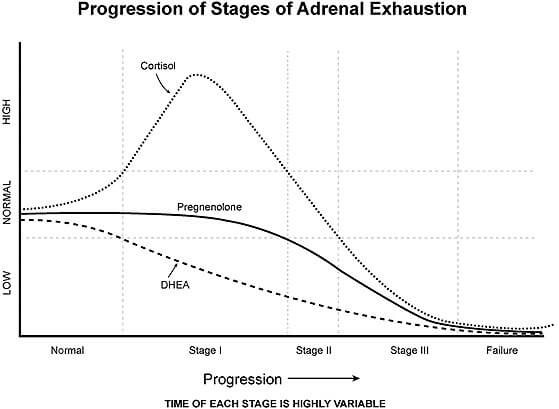Chronic and prolonged stress negatively affects our health. From a Functional Medicine perspective, the pathway by which this occurs is by the development of a syndrome called Adrenal Fatigue.
Stress is a normal part of life. In response to stress, our adrenal glands are meant to produce stress hormones, such as cortisol and adrenaline, which allow our bodies to better deal with that stress. This reaction to stress is also called our “fight-or-flight” and allows our bodies to optimize our performance, so that we can deal with the acute stressor.
While the acute stress response is an important part of how we function, our 21st-century lifestyle is full of chronic stress that exhausts the adrenal system.
Sources of chronic stress
When we think of the word “stress”, we often think about social/emotional stress, such as problems with our relationships, but there is a wide variety of potential emotional, physical, and physiologic stressors.
Sources of stress include:
-
Emotional: Anger/Fear, Worry/Anxiety, Depression, Guilt
-
Overwork
-
Physical strain or structural dysfunction
-
Excessive exercise
-
Sleep deprivation
-
Light-cycle disruption
-
Noise pollution
-
Late hours
-
Surgery
-
Trauma/Injury
-
Inflammation
-
Pain
-
Temperature extreme
-
Toxic exposure
-
Infections
-
Electromagnetic fields/Radiation
-
Gastrointestinal dysfunction
-
Blood sugar dysregulation
-
Nutritional deficiencies
-
Allergies/Sensitivities
Signs and Symptoms of Adrenal Fatigue:
-
Anxiety
-
Fatigue
-
Depression
-
Insomnia
-
Body aches
-
Increased chemical sensitivity, new allergies/sensitvities
-
Increased susceptibility to infections
-
GI dysfunction
-
Increased visceral adipose fat tissue
-
Craving for salty foods and sweets
-
Reproductive hormone imbalance
-
Thyroid dysfunction
-
Low blood pressure (poor sodium/water retention)
Diagnosis of Adrenal Fatigue
Laboratory evaluation of adrenal fatigue centers around measurement of the adrenal hormones.
Stage 1 (Alarm Stage): In response to an acute stressor cortisol output increases. Cortisol mobilizes energy for the skeletal muscle and brain by increasing blood sugar, decreasing insulin sensitivity, and inhibiting protein synthesis. Additionally, various functions are downregulated, so that energy may diverted away from them and towards dealing with the stressor. These functions include digestion, immune system, thyroid function, and detoxification. DHEA is an adrenal androgen that balances cortisol, and negates many of the harmful effects of excess cortisol on the body. DHEA is initially high, but slowly declines with progressive stress fixation.
Stage 2 (Resistance Stage): With progressive chronic stress, the cortisol starts to burn out and levels decline. In stage 2, the cortisol falls to the “normal” range; however, DHEA is low. Without the protective effect of DHEA, cortisol starts to cause negative side effects in the body and the body may not be able to respond to stress as optimally.
Stage 3 (Exhaustion Stage): Cortisol and DHEA are now low because of depletion of the adrenal reserve. In this stage, the classical symptoms of adrenal fatigue are most pronounced.

Treatment of Adrenal Fatigue
- Remove stressors
- Get plenty of sleep
- Minimize coffee or caffeinated beverages
- Minimize TV and computers, particularly before bedtime
- Exercise regularly
- Anti-stress techniques\
- Yoga
- Tai Chi
- Autonomic Training
- Online Mindfulness-Based Stress Reduction Class
- Whole food, unprocessed, low glycemic diet
- Use sea salt in the diet
- Nutritional supplementation
-
Vitamins/Minerals (B Vitamins, Magnesium, Vitamin C)
-
Herbs (i.e. adaptogens, such as Ashwagandha, Ginseng, Eleuthero, Licorice)
-
Glandulars (Adrenal glandular extracts)
-
If you are struggling with stress and have the sensation of being “burned out”, consider consulting with a Functional Medicine practitioner who can discuss the options for testing and treating an underlying adrenal issue.

